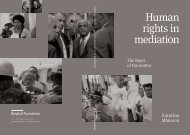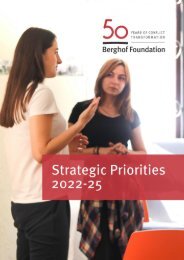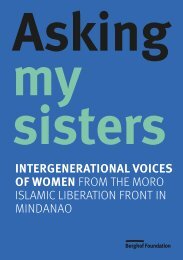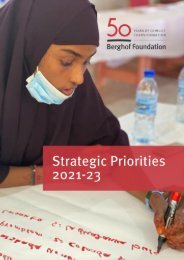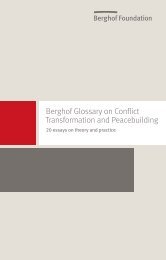Berghof Foundation: 50 years of conflict transformation
This book provides an overview of the Berghof Foundation’s work and impact over the past 50 years and sheds light on the challenges ahead of peacebuilding.
This book provides an overview of the Berghof Foundation’s work and impact over the past 50 years and sheds light on the challenges ahead of peacebuilding.
You also want an ePaper? Increase the reach of your titles
YUMPU automatically turns print PDFs into web optimized ePapers that Google loves.
Interview<br />
Inside<br />
the Intra-<br />
Afghan<br />
Conference<br />
for Peace<br />
Basir<br />
Feda<br />
Head <strong>of</strong> Unit<br />
Afghanistan<br />
and Central/South<br />
Asia at the <strong>Bergh<strong>of</strong></strong><br />
<strong>Foundation</strong><br />
The article on the previous page describes the Intra-<br />
Afghan Conference for Peace, which you facilitated.<br />
How did you experience it personally?<br />
I had been assigned the role <strong>of</strong> a facilitator<br />
at the very last minute and, to be honest, I was<br />
neither prepared nor ready. Our Afghan partners<br />
and the German Federal Foreign Office put an<br />
enormous amount <strong>of</strong> political capital and trust into<br />
this conference, which made this an extremely<br />
daunting task.<br />
But while pressure and responsibility were<br />
high, the reward was even higher. The outcome<br />
statement in which all participants agreed to reduce<br />
violence and identified conditions and cornerstones<br />
<strong>of</strong> a roadmap for peace was, <strong>of</strong> course, a huge<br />
achievement, but what was even more valuable and<br />
rewarding was to witness what happened in the room.<br />
Participants opened up and shared their grievances<br />
and pain — sometimes quite emotionally. They<br />
started humanising each other and realised that they<br />
had a lot more in common and that no single party<br />
had a monopoly over religion or politics. This is the<br />
essence <strong>of</strong> a dialogue.<br />
The Intra-Afghan Conference was a historic first.<br />
What made it possible, in your opinion?<br />
First and foremost, trust: the parties’ trust<br />
in each other but also the participants’ trust in the<br />
conveners <strong>of</strong> the dialogue. This allowed us to take<br />
away the right <strong>of</strong> self-selection from the various<br />
groups and parties and put together a somewhat<br />
unusual list <strong>of</strong> participants. While past attempts at<br />
convening Afghan actors for a dialogue have been<br />
very elitist — and unsuccessful — we tried to be more<br />
inclusive in our selection <strong>of</strong> participants and invited<br />
people from different constituencies and various<br />
segments <strong>of</strong> society.<br />
Even though there was criticism, which I<br />
believe is inevitable in such highly contested contexts,<br />
the dialogue and the way participants were selected<br />
received a lot <strong>of</strong> public support, which made it hard for<br />
anyone to openly and seriously undermine it.<br />
You mention trust as a central prerequisite for<br />
dialogue and mediation support work. How did you<br />
manage to establish that trust with the different<br />
parties in Afghanistan?<br />
I believe that this is mainly due to our longstanding<br />
engagement with all stakeholders. When we<br />
began our activities in Afghanistan in 2012/2013, we<br />
only worked with the High Peace Council. Once we got<br />
a better picture <strong>of</strong> all the actors and their interests and<br />
relations, we gradually expanded our engagement<br />
and started to provide capacity-building and technical<br />
support to a variety <strong>of</strong> actors, including the Taliban.<br />
The latter was a particularly risky endeavour<br />
at the time, both for us as an organisation and for<br />
me personally, as I have family living in Afghanistan.<br />
But it is only through this technical support and the<br />
appreciation there<strong>of</strong> — paired with my personal<br />
relationships and networks in Afghanistan — that we<br />
managed to build a relationship and develop trust with<br />
our Afghan partners.<br />
The dialogue in itself was successful. To what extent<br />
did it also advance the peace process as a whole?<br />
The dialogue conference and its outcome<br />
document were an opener for the formal intra-Afghan<br />
peace negotiations that started in September 2020.<br />
They provided a roadmap that paved the way to the<br />
current negotiation process and set an example <strong>of</strong><br />
what can be achieved if outside actors do not interfere<br />
with Afghan ownership and Afghan leadership <strong>of</strong> the<br />
process.<br />
We must do everything to ensure that<br />
these principles are also adhered to in the current<br />
negotiations. Just like the dialogue conference, the<br />
peace process will only succeed if it is truly Afghanowned<br />
and if there is no interference or distraction<br />
from impatient external actors driven by their own<br />
domestic politics.<br />
Would a peace agreement also mean the end <strong>of</strong><br />
<strong>Bergh<strong>of</strong></strong>’s engagement?<br />
Irrespective <strong>of</strong> what is achieved, we will<br />
provide our support as long as it is requested,<br />
keeping in mind that a peace agreement is only one<br />
step on a long and difficult path towards sustainable<br />
peace in Afghanistan. It is for this reason that we<br />
are increasingly focused on peace infrastructures.<br />
The aim is to turn the negative peace secured by<br />
an eventual agreement and characterised by the<br />
absence <strong>of</strong> violence into a positive peace that brings<br />
about a sustainable <strong>transformation</strong> <strong>of</strong> the <strong>conflict</strong>.<br />
78<br />
79





